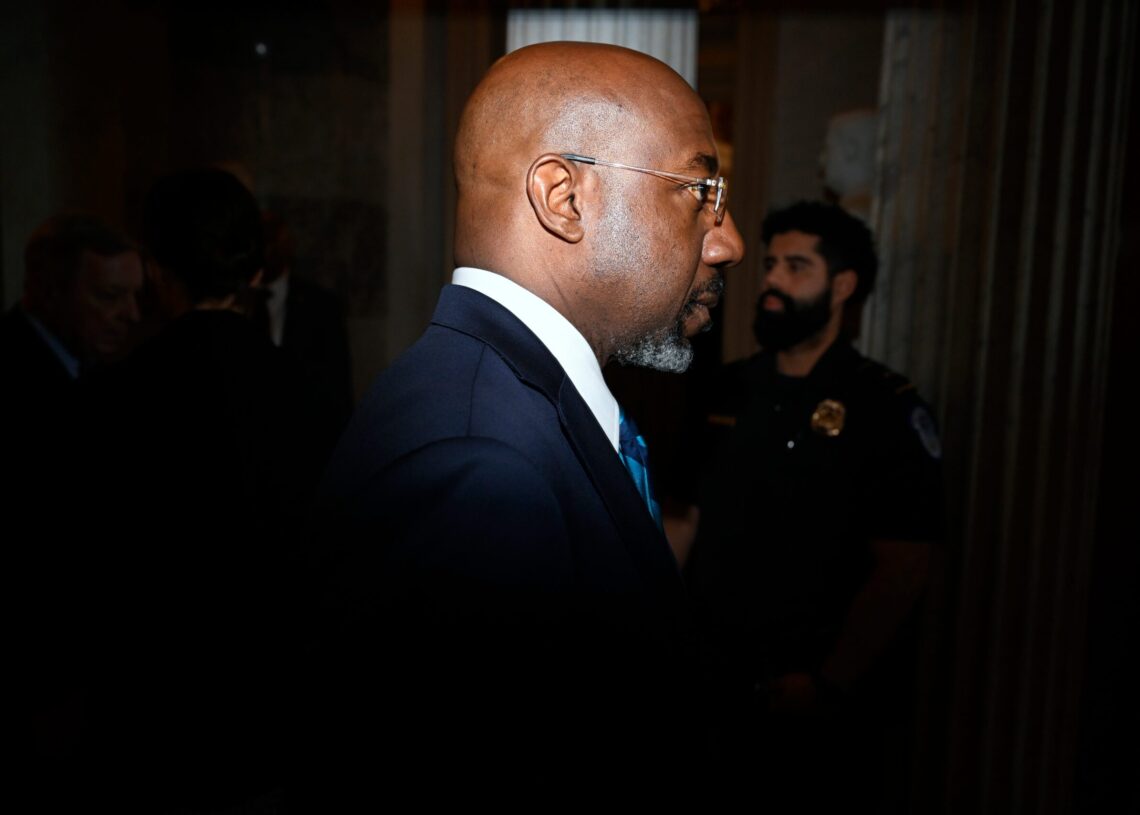Sen. Raphael G. Warnock opposed Monday’s vote to reopen the federal government, calling it “unacceptable” that the compromise deal did not fully address soaring health care premiums.
But the Georgia Democrat said on Monday that he couldn’t really blame the eight members of his caucus who broke ranks to vote to end the six-week standoff, pausing as he carefully explained his thinking.
Sen. Raphael G. Warnock opposed Monday’s vote to reopen the federal government, calling it “unacceptable” that the compromise deal did not fully address soaring health care premiums.
But the Georgia Democrat said on Monday that he couldn’t really blame the eight members of his caucus who broke ranks to vote to end the six-week standoff, pausing as he carefully explained his thinking.
“This was a tough … this was not an easy call,” he told reporters.
Warnock represents a considerable bloc of Senate Democrats who have not received much attention over the last three days: Democrats who voted against reopening the government, but who aren’t exactly angry that the shutdown is ending.
The spotlight has instead shone most brightly on those Democrats who voted with 52 Republicans to end the shutdown and those who argue the compromise was a mistake.
The former contend that a promise for a vote on health care legislation and returning some fired employees to the federal workforce were worth taking political heat to get government running again. Among the latter are the deal’s most outspoken critics. Sen. Elizabeth Warren (D-Massachusetts) called it a “terrible mistake” and Sen. Elissa Slotkin (D-Michigan) told reporters Democrats failed “to meet the moment.”
But there are a significant number of Senate Democrats who, like Warnock, do not fit easily into those two camps. These Democrats grew increasingly alarmed about the impact of the shutdown as it crossed over four weeks, then five weeks and now six weeks.
At first glance, this faction may seem reminiscent of a group of Republicans once known as the “Hope Yes, Vote No Caucus.” Those Republicans were fearful of getting on the wrong side of their far-right base, and privately supported leadership-drafted compromises but publicly bashed them.
The Democrats who negotiated the compromise with Republicans say that, like the “Hope Yes, Vote No Caucus,” some members of their party privately backed their actions but simply could not bring themselves to vote to end the shutdown because the liberal base was so fired up.
“I’ve talked to a number of my colleagues who said, ‘I’m so glad you did that, but I’m not I’m not going to vote with you,’” Sen. Jeanne Shaheen (D-New Hampshire) told The Washington Post’s Theodoric Meyer and a small group of reporters in a Monday interview.
While some Democrats may have feared the reaction of their base if they voted to reopen, others who opposed the deal argue that there were other factors that affected their votes.
Sen. Chris Coons (D-Delaware), whose political instincts tend toward negotiated compromise, issued a statement saying that he could “understand why” Shaheen and the others negotiated the deal because the shutdown would “continue to inflict harm on vulnerable Americans.”
But Coons said he voted no because he could not trust Republicans to reach a deal on extending expiring health care tax subsidies. Throughout the shutdown, Democrats have demanded that any deal to reopen the shutdown include an extension of enhanced Affordable Care Act subsidies ending at the end of 2025. The deal sealed this week does not, though it does include the promise that the Senate will vote on extending the subsidies.
“These are the folks who, when Trump was elected the first time, spent years saying they were going to improve on the ACA and replace it, and they never did. They never came out with a credible plan,” Coons told reporters after Monday’s votes.
In a floor speech before Monday’s votes, Sen. Patty Murray (D-Washington), who also voted no, echoed Coons’ sentiment. She accused Republicans of firing up “the old bad ideas machine” by holding discussions about rewriting portions of the 2010 Affordable Care Act rather than engaging in serious talks about finding a compromise on the subsidies.
But Murray, the top Democrat on the Appropriations Committee, pivoted her speech to praise the underlying legislation beneath a simple “continuing resolution” to reopen the government: a bipartisan package giving full-year budgets to roughly a quarter of the federal agencies.
“It is important that Democrats were at the table on the CR and our first three funding bills, and used our spot at that table to fight for hardworking families,” Murray said.
Political considerations may have also affected lawmaker votes. To some degree, Democrats found themselves guilty of their own success — never before has a party completely out of power so clearly won the political side of a shutdown standoff, as polls showed that more voters blamed Trump and Republicans for the impasse.
In previous shutdowns, the president usually prevailed by using the bully pulpit to beat down Congress and make the other party surrender with no real concessions.
This time, not only were voters blaming Republicans, but Trump’s political standing kept sinking throughout the shutdown, culminating with last Tuesday’s Democratic dominance of elections in Virginia, New Jersey, California, Pennsylvania, Georgia and other states.
Those wins created an impression among many Democrats that their party only stood to gain by keeping the government shuttered. But they also elevated voices calling on Democrats to strike a deal.
On Tuesday, hours before Abigail Spanberger would record the biggest Democratic victory in a Virginia governor’s race in decades, Sen. Mark R. Warner (D-Virginia) pulled out his phone at a party luncheon to read remarks she had given on the trail, according to three senators there.
Spanberger suggested both parties needed to work together to end the shutdown, Warner told the senators, a comment that some colleagues took as Warner’s own endorsement of moving to end the shutdown.
Gov.-elect Spanberger delivered that message to a national audience Sunday in an NBC “Meet The Press” interview, when she said that government “needs to open immediately” and called on Democrats to vote with Republicans to do so.
In his remarks explaining his vote against reopening government, Warner cited the lack of a firm deal on health care. But he also credited Shaheen and other Democrats for a part of the deal that eliminated more than 4,000 reduction-in-force notices that went to federal workers during the shutdown.
Those firings, and the overall human toll of the shutdown, prompted many Democrats who voted no to not entirely be sorry the shutdown is nearing its end.
“Virginia has been particularly hard hit by this now record government shutdown. Federal workers, contractors — many of the folks, for example, who clean the federal buildings are contractors. They’re never going to get back pay,” Warner said in a video statement released to constituents Monday.
Weighing on his mind, Warnock said, were the federal workers he saw every time he traveled through Hartsfield-Jackson Atlanta International Airport or passed by the Capitol Police or saw his staff, which has worked for weeks without pay. Not to mention the thousands employed at the Centers for Disease Control headquartered in Atlanta.
None of those workers had been paid since maybe early October, and their financial troubles grew each week. So in late October, when Republicans offered a bill to at least pay federal workers who were forced to stay on the job during the shutdown, Warnock and Sen. Jon Ossoff (D-Georgia) voted with the GOP, but the legislation fell several votes short of clearing a filibuster.
Warnock saw the Republican approach to the shutdown as a game of attrition, betting Democrats wouldn’t let bad things happen to people who need government services.
“This is a tough situation. I think that the Republicans were counting on the idea that we care about people more than they do,” he said Monday.
The GOP strategy nearly worked on Warnock, who said the ongoing court fights over blocking full payments to food assistance recipients nearly pushed him to vote to reopen the government.
“I think it’s beyond craven. It shows a deep kind of moral rot,” he said.
In her floor speech otherwise opposing the legislation, Murray highlighted how she negotiated those bipartisan spending bills to provide full funding to that food program as well others designed to help low-income families.
“This bill ensures that 7 million moms and babies will get the full nutrition benefits they rely on,” she said.
Like Warnock, she voted no, but said it wasn’t an easy call.
The post ‘Not an easy call’: The Democrats who struggled with their shutdown vote
appeared first on Washington Post.




